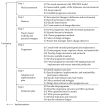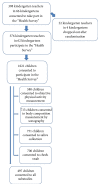Design, Implementation, and Study Protocol of a Kindergarten-Based Health Promotion Intervention
- PMID: 28303253
- PMCID: PMC5338306
- DOI: 10.1155/2017/4347675
Design, Implementation, and Study Protocol of a Kindergarten-Based Health Promotion Intervention
Abstract
Inactivity and an unhealthy diet amongst others have led to an increased prevalence of overweight and obesity even in young children. Since most health behaviours develop during childhood health promotion has to start early. The setting kindergarten has been shown as ideal for such interventions. "Join the Healthy Boat" is a kindergarten-based health promotion programme with a cluster-randomised study focussing on increased physical activity, reduced screen media use, and sugar-sweetened beverages, as well as a higher fruit and vegetable intake. Intervention and materials were developed using Bartholomew's Intervention Mapping approach considering Bandura's social-cognitive theory and Bronfenbrenner's ecological framework for human development. The programme is distributed using a train-the-trainer approach and currently implemented in 618 kindergartens. The effectiveness of this one-year intervention with an intervention and a control group will be examined in 62 kindergartens using standardised protocols, materials, and tools for outcome and process evaluation. A sample of 1021 children and their parents provided consent and participated in the intervention. Results of this study are awaited to give a better understanding of health behaviours in early childhood and to identify strategies for effective health promotion. The current paper describes development and design of the intervention and its implementation and planned evaluation. Trial Registration. The study is registered at the German Clinical Trials Register (DRKS), Freiburg University, Germany, ID: DRKS00010089.
Conflict of interest statement
The authors declare that there is no conflict of interests regarding the publication of this paper.
Figures



References
Publication types
MeSH terms
LinkOut - more resources
Full Text Sources
Other Literature Sources
Medical

